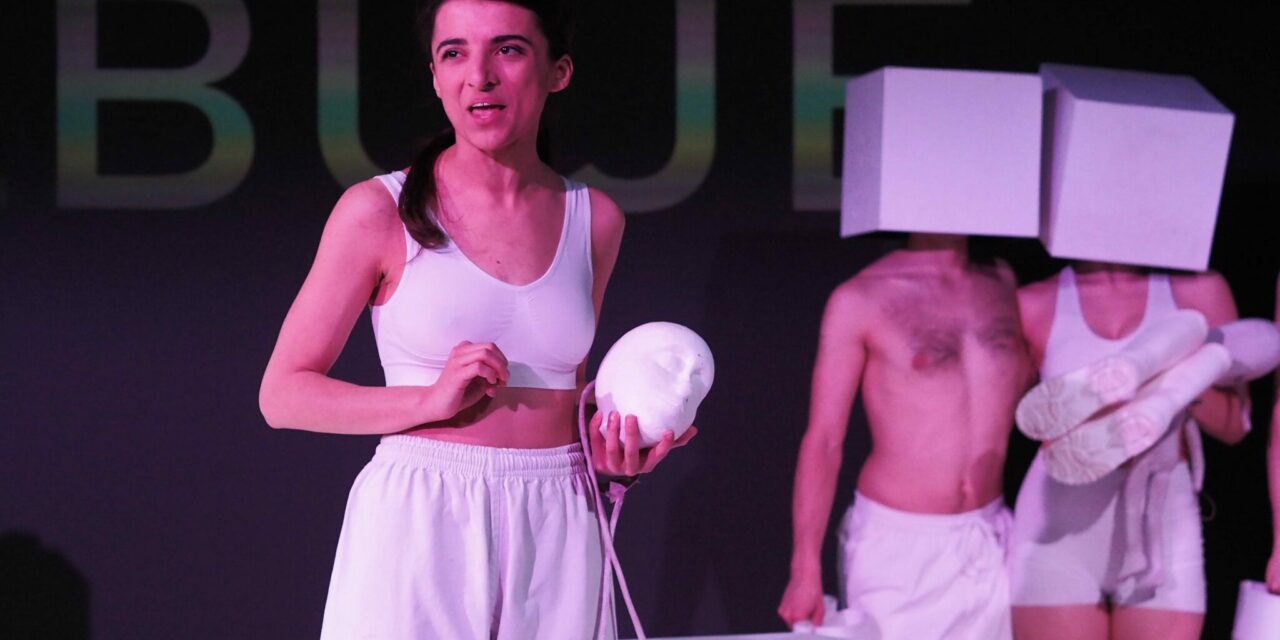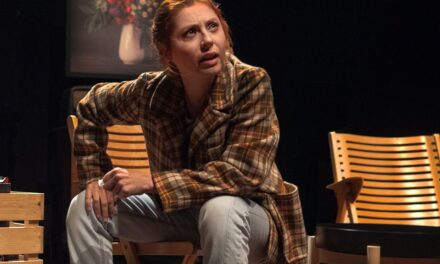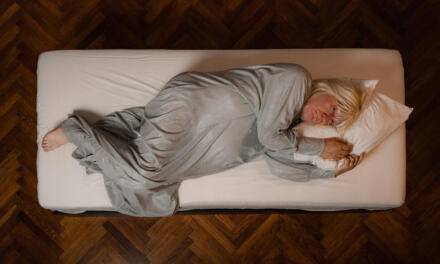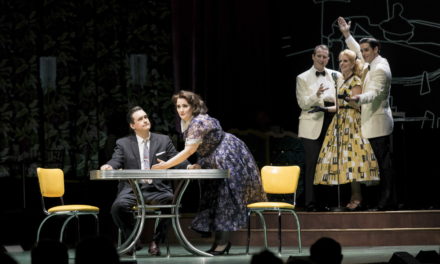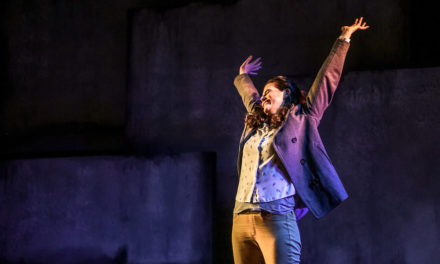The play begins with an entrance exam. Clad in suit jackets, a group of women and men sit onstage on white pedestals of varying heights. In the middle, also on a pedestal, lies a small white table-top puppet. A TV screen backstage displays a sign saying what event we are watching. The names are read out one by one. The person summoned is required to take the puppet and enact the instructions given by the other performers, who are playing faculty members. ‘Come closer and show your face, please. Thank you, that’s all we need to know’, one of the girls is told, and then the examiners talk behind her back discussing whether she qualifies for admission to the school or not. The words ‘Too big’ can be heard bringing the discussion to an end. The next candidate, a female, is asked to get so close to one professor that he can peek down her top. The men are given absurd instructions as well, they are provoked and ridiculed. Both male and female candidates are infantilised ‒ the examiners address them using the diminutive forms of their names, and deliver their instructions in a tone usually reserved for toddlers. The opening scene of the graduation show of the 4th year of the Wrocław Faculty of Puppetry of the Academy of Theatre Arts is based, as one can guess, on the students’ experiences. With the help of director Martyna Majewska, The Weak Year sees them settle the score with the school where they have studied for the past four years.
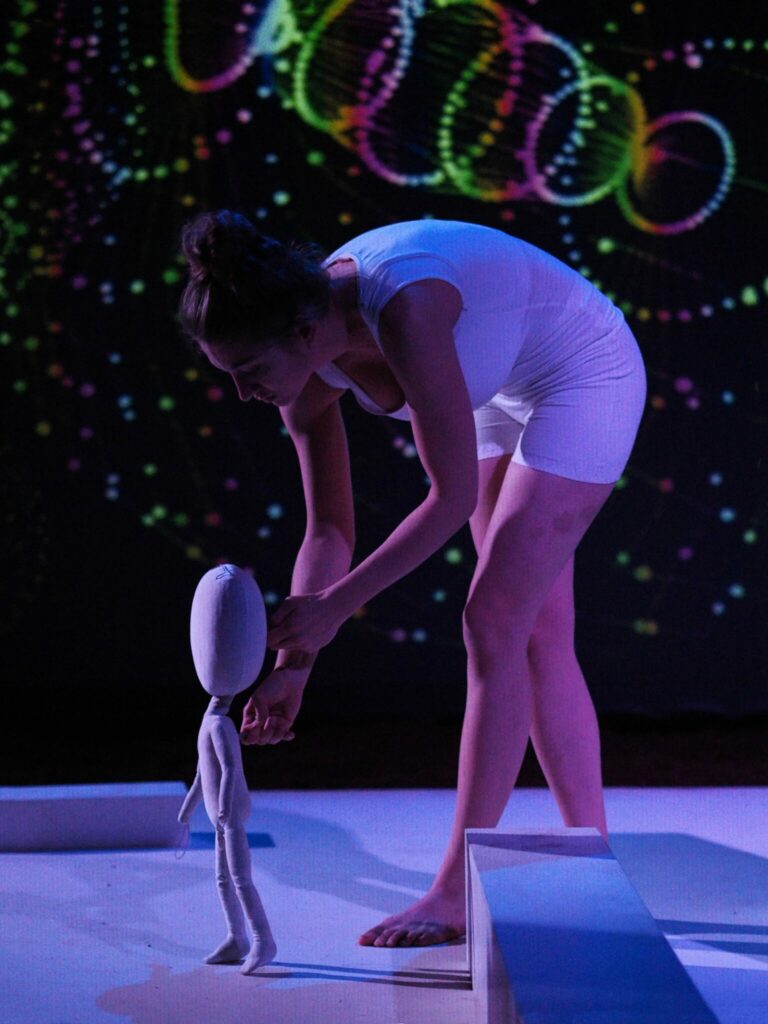
Matylda Matuszak in Słaby Rok. Photo by Kamila Grela.
The title itself is telling: the performers we see onstage have been rated as a weak year. Reportedly, this is also how they were described to the director of the graduation show before she got on board. The first, powerful scene, which parodies (or perhaps recreates) the students’ entrance exams, says a thing or two not only about how one becomes, or does not become, a puppetry student, but also ‒ as the actors take turns playing the exam board members and candidates (in this scene, as in the whole show, they appear under their own names) ‒ it reveals how the school’s conservative norms and behaviours are upheld. After all, most of the faculty members are former students who are likely to have experienced similar treatment back in the day. The exam scene serves as the prelude, which is split into two parts whose titles are displayed on the screen. In the first part, the performers try to answer the question ‘How an artist is born?’ In the second, they talk about the dreams that have shaped them.
The show places personal experiences in the broad perspective of reflection on how artists are perceived and how they engage the economic and cultural complexities of the art world. The performers are generous with irony and mockery. In one scene, Joanna Sobocińska puts on a blonde wig with a short plait and, sitting stiffly upright, recites an excerpt from Agnieszka Osiecka’s letter to Jeremi Przybora. The letter is the poet’s confession in which she says she has never loved anyone like she loves Przybora, but Sobocińska’s face, body and voice remain unwavering, mechanical, impassive. After a while, the recitation segues seamlessly into a complaint that the poet’s dull, dated text is poor material to build a part on. After all, no theatre director will be interested in ‘the actress whose delivery of that Osiecka monologue was average’. Then Sobocińska pulls the wig off her head and, in a normal, emotional voice, says she is an average actress. ‘Average’ meaning one who sometimes nails it, but her usual standard is just fine. One that will never make it big. Sobocińska’s handling of this self-deprecating theme of course proves, perversely, that she is a very fine thespian (by the way, her performance is among the best in the show), but the theme raises important questions such as: How many drama school graduates land acting jobs in theatres? How many of them get to play major parts? What happens to middle-aged actors, the eternal bit players whose names are remembered with difficulty even by theatre patrons?
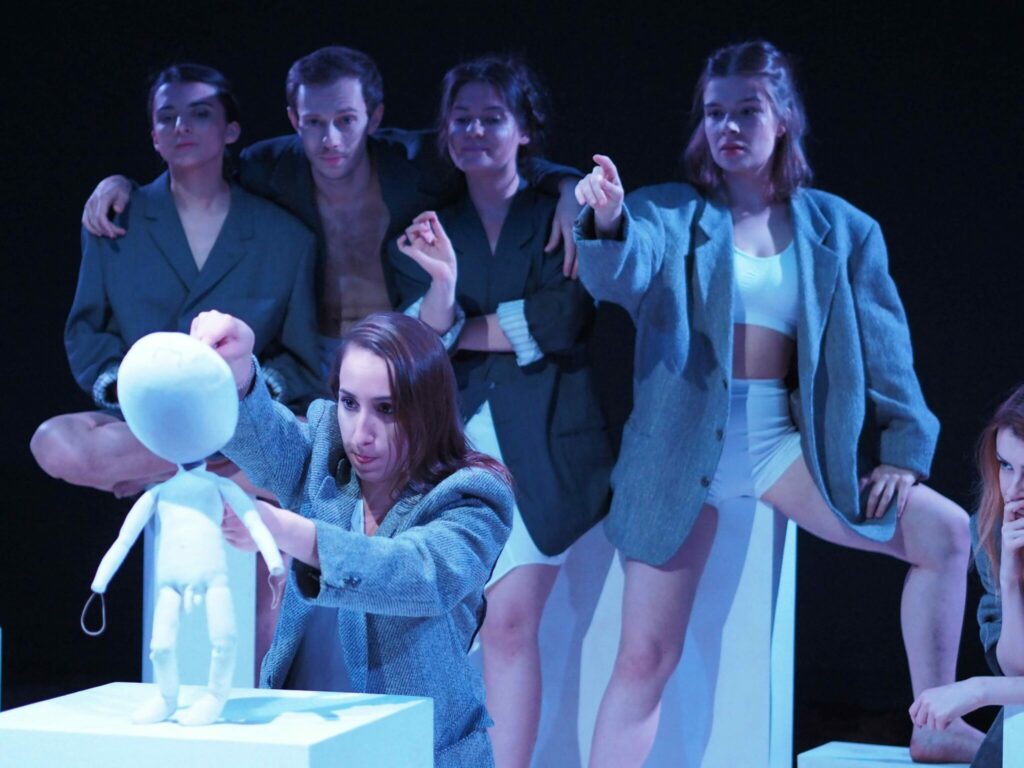
Martyna Matoliniec, Łukasz Zubrzycki, Kaja Janiszewska, Zuzanna Kotara, Samanta Zwolennik, and Joanna Sobocińska (with a puppet) in Słaby Rok. Photo by Kamila Grela.
Their predicament is also addressed by Łukasz Zubrzycki in his scene. Zubrzycki plays an actor who is asked to give a TV interview. The actress playing the journalist, frozen in a mermaid-like pose reminiscent of TVP journalist Elżbieta Jaworowicz, asks questions in a computer-like voice. All her questions are equally trite, but Zubrzycki long retains an enthusiasm unwarranted by the situation. He gestures wildly, walks back and forth, changes his voice, makes faces ‒ he is extremely excited because TV appearances are few and far between. The interview must be enjoyed, even if you have to repeat the mantra that talent is not enough in this job and that it takes hard work to succeed. When Zubrzycki is asked to describe his studies in the puppetry faculty, he compares them to the experience of an athlete taking part in events held in the dark. Having no reference points or guidelines, he does not know if he will trip and fall or take first place.
Zubrzycki’s rather enigmatic metaphor took on a new meaning after the piece was first performed. When one of the first performances of The Weak Year was delayed, a message was published on Facebook saying the drama school demanded that the performance be called off, but the audience wanted to see it and, finally, their wish was granted. The following day, the Academy of Theatre Arts released a statement ‒ also on Facebook ‒ saying that the delay was only due to copyright concerns, and the problem was resolved. Despite the school’s assurances of its full support for the show, it was not long before another controversy emerged: the school authorities withdrew The Weak Year from the Drama Schools Festival in Łódź. The reason given was ‘failure to meet the festival’s entry criterion that requires graduation shows to present the Faculty’s specific character’ (Komunikat Rady Pedagogicznej, 26 April 2019). Puppeteers and dancers have only been eligible to enter the festival for the past three years. In 2014, students of the Faculties of Puppetry and Dance Theatre of the then PWST in Kraków (now the Academy of Theatre Arts) wrote two open letters demanding the right to present their graduation shows at the Drama Schools Festival. They said they had been deprived of the chance to enter the festival in 1997, pointing out they neither understood nor accepted this. Their voice was not heard until 2017 when new school authorities were in place. Graduation productions of non-acting faculties are now staged outside the competition in the fringe section of the Festival, but even this offers the students the opportunity to show their work to a wider audience and perhaps bring it to the attention of directors and theatre managers.
When the authorities decided that The Weak Year failed to meet the festival’s criteria, the students replied with a letter listing all the techniques of animated storytelling theatre used in the show (see List otwarty dyplomantów Wydziału Lalkarskiego AST, 23 April 2019). Indeed, the piece includes not only puppet and object animation, elements of shadow theatre and mask acting, but it also showcases the actors’ extraordinary physical skills and ability to work with an array of various materials and theatre forms. Among those who spoke up for The Weak Year were actress Alina Czyżewska (see Nie wierzę Dorocie Segdzie, 30 April 2019) and director Jakub Krofta (see List otwarty do Marka Waszkiela, 25 April 2019). They both pointed out the illogical expectations placed on puppetry students and asked who and how determines the degree to which a show is or is not a ‘puppet’ play. Of course, there was also speculation that what the show said about drama school education was inconvenient for the school authorities, and that withdrawing it from the festival was tantamount to censorship. The Academy strongly objected to this interpretation of its decisions (see e.g. Rektor Dorota Segda odpowiada dyplomantom, 25 April 2019). The creators of The Weak Year announced they would stage two protest performances in Łódź, but they did not have to because their show was reinstated to the festival’s programme.
The Wrocław graduation show opened up an important debate on the expectations placed on puppeteers and puppetry. The Weak Year is a deliberate artistic statement using techniques of animated storytelling theatre to push the envelope of dramatic expression, which makes it possible to at least question the assumption that puppetry shows are completely different from the work of students of other faculties and should be entered in the non-competitive section. The young actors are aware that choosing the puppetry faculty means a harder road ahead ‒ it is no accident they so often mention their own names in the show, which serves to stress that they need to try harder to be noticed.
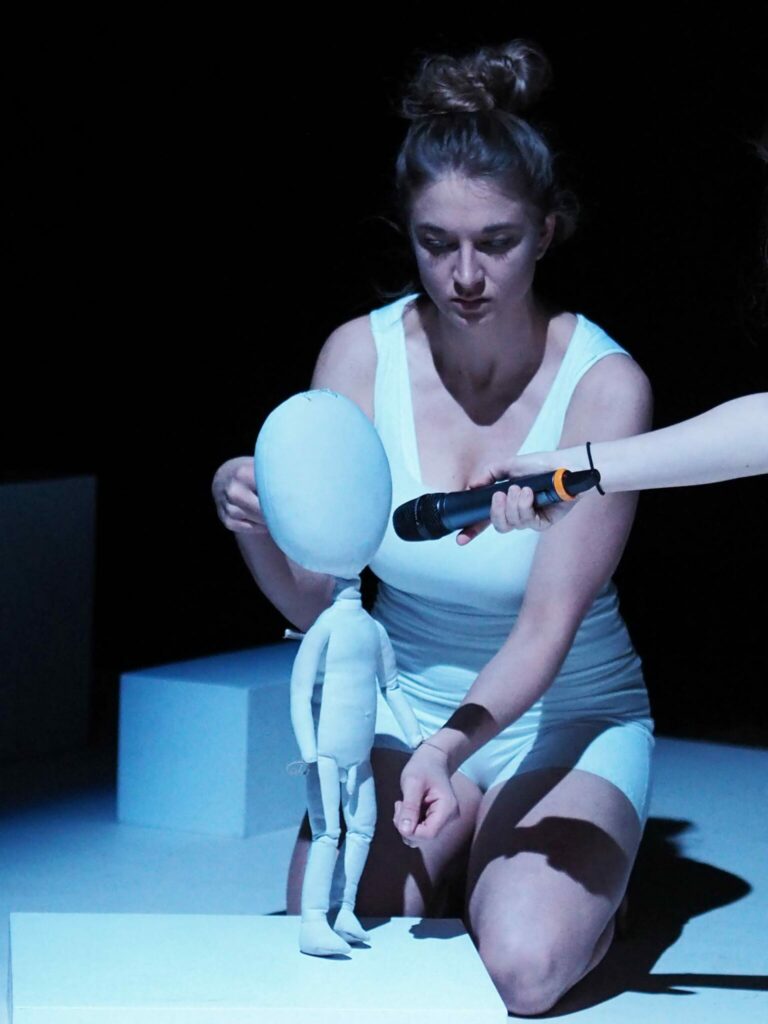
Matylda Matuszak in Słaby Rok. Photo by Kamila Grela.
The Weak Year is, of course, also a graduation show in the full sense of the word, i.e. it conforms to the typical, tedious-yet-necessary format where each performer is given time to shine. Not all scenes are equally good, and the piece as a whole sometimes lacks in dramaturgic quality. The sequences focused on the condition of the actor and the challenges facing puppetry, as well as the comments about the quality of education, pack a punch. Yet they abut scenes addressing completely different themes (such as the way art functions in museums and the artistic techniques of looking), only loosely linked to the themes mentioned above, and as a result the message becomes blurred. This, however, does not change the fact that each actor in the show has something interesting to say, that together they put across deliberate, clear messages, and that their first show reveals them as intelligent, courageous and independent. In the last scene, the graduates arrange their bodies into a mountain topped by the table-top puppet they used in the exam scene. The puppet is faceless, and the actress who animates it, Matylda Matuszak, is perfectly visible. The words that end the show are not only a great conclusion but also the first voice in the discussion that The Weak Year was meant to start:
‘I can say what should have been said from this stage a long time ago. Puppets evolve, puppets are no longer what you think they are. They transcend imagination, they have not had a stick up their asses for a long time now. They are objects, they are an image and movement, a composition. […] We no longer hide in black. We are LOVE & HATE. We are broken dreams and guilty fascination. Arses worked off behind the screen and sweaty masks. Humiliation for effect.’
Słaby Rok [The Weak Year], Academy of Theatre Arts in Kraków, Wrocław Branch, Puppetry Department
Directed by Martyna Majewska; music by Dawid Majewski; stage design by Anna Haudek; costumes by Artur Mazur; projections by Piotr Bartos; choreography by Magda Marcinkowska.
Premiered on 12 April 2019
Dziś zagramy po raz ostatni w tym sezonie. Zagramy SŁABY ROK, zobaczcie więc teaser spektaklu i żałujcie, jeśli się nie wybraliście ???Trailer by: Piotr Bartos
Posted by Akademia Sztuk Teatralnych – Filia we Wrocławiu on Thursday, May 23, 2019
References:
Czyżewska Alina, Nie wierzę Dorocie Segdzie. Sprawa odwołania spektaklu „Słaby rok” z FST w Łodzi [I do not believe Dorota Segda: on the calling off of the show The Weak Year], Nic do ukrycia blog, 30 April 2019.
Krofta Jakub, List otwarty do Marka Waszkiela [Open letter to Marek Waszkiel], e-teatr.pl, 25 April 2019.
List otwarty dyplomantów Wydziału Lalkarskiego AST, e-teatr.pl, 24 April 2019.
Rektor Dorota Segda odpowiada dyplomantom [Vice-chancellor Dorota Segda replies to the graduates], e-teatr.pl, 25 April 2019.
This article was originally published in Polish by Didaskalia. Theater Journal 2019, no. 151-152. It was translated into English for Didaskalia and TheTheatreTimes.com and reposted with permission.
This post was written by the author in their personal capacity.The opinions expressed in this article are the author’s own and do not reflect the view of The Theatre Times, their staff or collaborators.
This post was written by Katarzyna Waligóra.
The views expressed here belong to the author and do not necessarily reflect our views and opinions.

